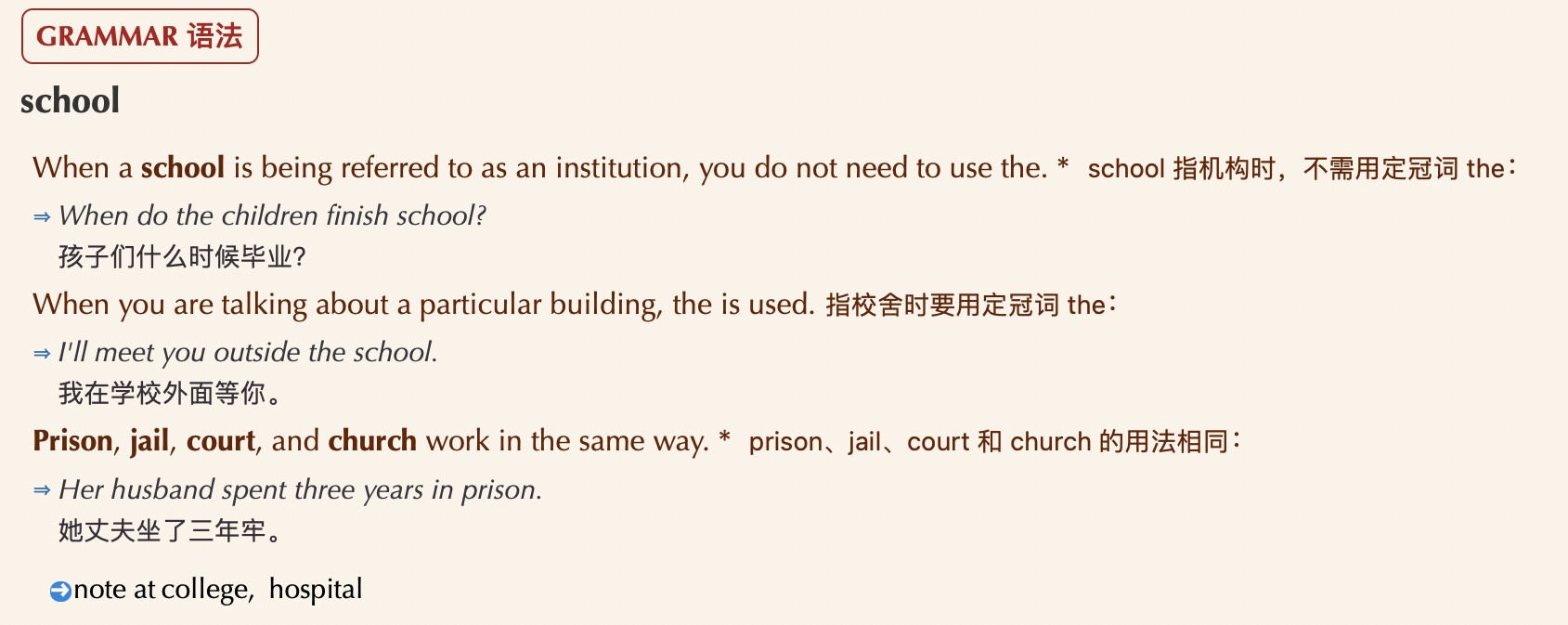3 单独的school前面为什么没有冠词
According to Cynthia, school and friendship / relaxation are both important.
这是高中英语新教材译林版必修1第2单元的句子(p23)。
我知道 go to school, in school, at school 这些固定搭配是不用冠词。但这个 school 不属于这一类吧,为什么没有冠词?
最佳答案 2022-01-21 08:14
你误会了。并不是说只有go to school, in school, at school 这些固定搭配才不用冠词。School前面用不用冠词主要与它所表示的意思有关。
1.表示“学校”时,若指的是具体的place,是可数名词,其前需要根据语境的需要使用冠词或其他限定词。如:
The school is beautiful. 这所学校很美。
This is a modern school. 这是一所现代化的学校。
My home lies back of the school. 我家就在学校后面。
Just across from our house there’s a school. 就在我们房子的对面有一所学校。
但是,若它不是表示“学校”本身,而是指与之有关的一些活动(如上课、学习等),是不可数名词,且此时通常不用冠词。如:
School begins in September. 学校9月开学。
School begins at eight. 学校8点开始上课。
He is at school now. 他现在在上课。
He finished school last year. 他去年完成学业。
比较下面的句子:
He goes to school every day. 他每天都去上学(读书)。
He goes to the school every day. 他每天都去这所学校。
She likes school. 她喜欢上学。
She likes the school. 她喜欢这所学校。
2.补充:汉语说“上学”(读书、学习),英语用 go to school,其中的school前不用冠词,即使school用于专有名词也是一样。如:
He goes to HongxingSchool. 他上红星中学。
He went to No. 6 Middle School of Changsha. 他上长沙市6中。
但是,若school前有描绘性修饰语,则通常要用不定冠词。如:
They go to a good school. 他们进了一所好学校。
Our children go to a mixed school. 我们的孩子上男女混合的学校。
不过,如果school前的修饰语不是描绘性的,而只是表明一种分类,则用不用冠词均可(但以不用为普通)。如:
If I were you, I’d go to night school. 如果我是你,我就上夜校。
Both their children go to boarding school. 他们的两个孩子都上寄宿学校。
I’m the only one who’s gone to a public high school. 我是唯一上过公立中学的人。
但是,如若需特指,则其前要用定冠词。如:
It is very important that he should go to the School of Art. 他上美术学校至关重要。
Many children are not able to go to the school of their choice. 许多孩子不能上他们想上的学校。
值得注意的是,即使有后置修饰语修饰,若意义不是特指,其前也不用定冠词,而用不定冠词。如:
We go to a school close to our home. 我们去一所离家很近的学校上学。
注:摘自下载的英语用法词典。
- 2 关注
- 0 收藏,5634 浏览
- 黎彬彬 提出于 2022-01-16 08:49
相似问题
-
 《高考英语备考1号·速效编》
《高考英语备考1号·速效编》
-
 《高考英语备考1号·写作编》
《高考英语备考1号·写作编》
-
 《高中英语晨读晚记》
《高中英语晨读晚记》
-
 《高中英语错题笔记》
《高中英语错题笔记》
-
 《零起点考大学英语》
《零起点考大学英语》
-


